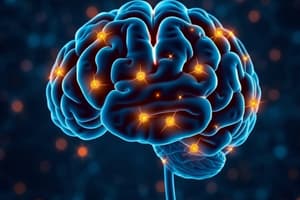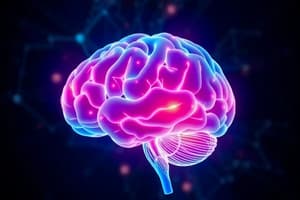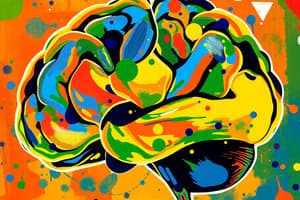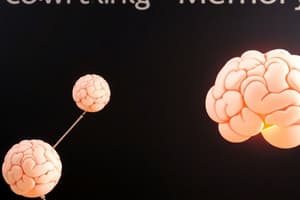Podcast
Questions and Answers
What differentiates short-term memory (STM) from long-term memory (LTM)?
What differentiates short-term memory (STM) from long-term memory (LTM)?
- STM is responsible for storing factual information only.
- LTM cannot process information as quickly as STM.
- LTM only retains information for a short duration.
- STM includes working memory as a subcategory. (correct)
Which stage is NOT part of the memory process?
Which stage is NOT part of the memory process?
- Retrieval
- Storage
- Transcription (correct)
- Encoding
What is a characteristic of proactive control?
What is a characteristic of proactive control?
- It involves anticipating events and preparing for them. (correct)
- It is a reaction to conflicts as they arise.
- It primarily focuses on past experiences.
- It relies heavily on immediate sensory feedback.
Which of the following is a core process of cognitive control?
Which of the following is a core process of cognitive control?
How do calcium and neural communication contribute to memory formation?
How do calcium and neural communication contribute to memory formation?
What is the primary function of the hippocampus?
What is the primary function of the hippocampus?
What deficit is commonly associated with damage to the hippocampus?
What deficit is commonly associated with damage to the hippocampus?
Which lobe of the brain is primarily responsible for decision-making and impulse control?
Which lobe of the brain is primarily responsible for decision-making and impulse control?
What type of neuron sends signals through neurotransmitters?
What type of neuron sends signals through neurotransmitters?
What occurs during the depolarization stage of membrane potential?
What occurs during the depolarization stage of membrane potential?
Which of the following describes the resting potential of a neuron?
Which of the following describes the resting potential of a neuron?
What is the role of voltage-gated channels at -55 mV?
What is the role of voltage-gated channels at -55 mV?
What types of cells are responsible for forming the myelin sheath?
What types of cells are responsible for forming the myelin sheath?
What occurs during hyperpolarization of a neuron?
What occurs during hyperpolarization of a neuron?
What is the primary function of the sodium-potassium pump in a neuron?
What is the primary function of the sodium-potassium pump in a neuron?
What describes the absolute refractory period in a neuron?
What describes the absolute refractory period in a neuron?
Which of the following statements is true about relative refractory period?
Which of the following statements is true about relative refractory period?
What is saltatory conduction?
What is saltatory conduction?
What type of channel remains always open?
What type of channel remains always open?
What are precursor chemicals in the context of neurotransmitter synthesis?
What are precursor chemicals in the context of neurotransmitter synthesis?
How does diffusion relate to the movement of molecules in neurons?
How does diffusion relate to the movement of molecules in neurons?
What is the role of Opsin in the phototransduction process?
What is the role of Opsin in the phototransduction process?
Which type of cell is primarily responsible for transmitting signals to the brain in response to light?
Which type of cell is primarily responsible for transmitting signals to the brain in response to light?
In terms of visual acuity, which cell type has better sensitivity under low light conditions?
In terms of visual acuity, which cell type has better sensitivity under low light conditions?
What role does the basal ganglia serve within the context of motor function?
What role does the basal ganglia serve within the context of motor function?
Which condition is characterized by excessive, uncontrolled movements?
Which condition is characterized by excessive, uncontrolled movements?
How does the receptive field function in neuronal response to visual stimuli?
How does the receptive field function in neuronal response to visual stimuli?
What best describes the structure of rods compared to cones?
What best describes the structure of rods compared to cones?
What is primarily supported by the vermis section of the cerebellum?
What is primarily supported by the vermis section of the cerebellum?
How are body parts represented in the primary motor cortex?
How are body parts represented in the primary motor cortex?
Which type of cells are responsible for connecting receptors with bipolar cells in the retina?
Which type of cells are responsible for connecting receptors with bipolar cells in the retina?
What occurs during the closing phase of sodium channels in phototransduction?
What occurs during the closing phase of sodium channels in phototransduction?
What is the primary function of the spinal cord concerning motor control?
What is the primary function of the spinal cord concerning motor control?
What is the primary difference in spatial resolution between rods and cones?
What is the primary difference in spatial resolution between rods and cones?
Which term refers to the loss of coordination, resulting in unsteady or clumsy movements?
Which term refers to the loss of coordination, resulting in unsteady or clumsy movements?
What is the primary responsibility of the premotor cortex and supplementary motor area?
What is the primary responsibility of the premotor cortex and supplementary motor area?
What is dysmetria, and how does it affect movement?
What is dysmetria, and how does it affect movement?
What part of the prefrontal cortex is primarily responsible for activating decision-related control?
What part of the prefrontal cortex is primarily responsible for activating decision-related control?
Which syndrome is characterized by difficulty managing daily activities?
Which syndrome is characterized by difficulty managing daily activities?
Which of the following best describes the role of the anterior part of the prefrontal cortex?
Which of the following best describes the role of the anterior part of the prefrontal cortex?
What is the function of the anterior cingulate cortex (ACC) during tasks like the Stroop test?
What is the function of the anterior cingulate cortex (ACC) during tasks like the Stroop test?
What best defines disinhibition syndrome?
What best defines disinhibition syndrome?
Which area is crucial for processing language during tasks requiring attention, such as the Stroop test?
Which area is crucial for processing language during tasks requiring attention, such as the Stroop test?
In decision-making, how does the frontal cortex work with other areas of the brain?
In decision-making, how does the frontal cortex work with other areas of the brain?
Damage to which part of the brain is associated with difficulties in inhibitory control?
Damage to which part of the brain is associated with difficulties in inhibitory control?
How do lesions in the frontal lobe impact behavior?
How do lesions in the frontal lobe impact behavior?
Which part of the brain is involved with planning, simulating consequences, and behavioral control?
Which part of the brain is involved with planning, simulating consequences, and behavioral control?
Flashcards
Phototransduction
Phototransduction
The process of converting light energy into electrical signals in the retina.
Rods
Rods
Photoreceptor cells responsible for low-light vision and detecting shades of gray.
Cones
Cones
Photoreceptor cells responsible for color vision and fine detail.
Visual Receptive Field
Visual Receptive Field
Signup and view all the flashcards
Converging Receptive Fields
Converging Receptive Fields
Signup and view all the flashcards
Non-converging Receptive Fields
Non-converging Receptive Fields
Signup and view all the flashcards
Bipolar Cells
Bipolar Cells
Signup and view all the flashcards
Ganglion Cells
Ganglion Cells
Signup and view all the flashcards
Hyperpolarization
Hyperpolarization
Signup and view all the flashcards
Refractory Period
Refractory Period
Signup and view all the flashcards
Absolute Refractory Period
Absolute Refractory Period
Signup and view all the flashcards
Relative Refractory Period
Relative Refractory Period
Signup and view all the flashcards
Saltatory Conduction
Saltatory Conduction
Signup and view all the flashcards
Diffusion
Diffusion
Signup and view all the flashcards
Leakage Channel
Leakage Channel
Signup and view all the flashcards
Voltage-Gated Channel
Voltage-Gated Channel
Signup and view all the flashcards
Hippocampus function
Hippocampus function
Signup and view all the flashcards
Frontal lobe function
Frontal lobe function
Signup and view all the flashcards
Occipital lobe function
Occipital lobe function
Signup and view all the flashcards
What is the function of the membrane potential?
What is the function of the membrane potential?
Signup and view all the flashcards
Depolarization
Depolarization
Signup and view all the flashcards
Repolarization
Repolarization
Signup and view all the flashcards
What are the two types of neuronal communication?
What are the two types of neuronal communication?
Signup and view all the flashcards
What are the stages involved in the action potential?
What are the stages involved in the action potential?
Signup and view all the flashcards
STM vs. LTM
STM vs. LTM
Signup and view all the flashcards
What is working memory?
What is working memory?
Signup and view all the flashcards
Long-term memory types
Long-term memory types
Signup and view all the flashcards
Memory formation stages
Memory formation stages
Signup and view all the flashcards
Cognitive Control: What is it?
Cognitive Control: What is it?
Signup and view all the flashcards
Basal Ganglia's Role
Basal Ganglia's Role
Signup and view all the flashcards
What does the cerebellum do?
What does the cerebellum do?
Signup and view all the flashcards
What is ataxia?
What is ataxia?
Signup and view all the flashcards
Cortical Homunculus
Cortical Homunculus
Signup and view all the flashcards
Role of Premotor Cortex and SMA
Role of Premotor Cortex and SMA
Signup and view all the flashcards
Spinal Cord's Role
Spinal Cord's Role
Signup and view all the flashcards
What is a reflex arc?
What is a reflex arc?
Signup and view all the flashcards
Effects of Spinal Cord Injury
Effects of Spinal Cord Injury
Signup and view all the flashcards
Prefrontal Cortex (PFC)
Prefrontal Cortex (PFC)
Signup and view all the flashcards
Dorsal Prefrontal Cortex (DLPFC)
Dorsal Prefrontal Cortex (DLPFC)
Signup and view all the flashcards
Ventral Prefrontal Cortex (VPFC)
Ventral Prefrontal Cortex (VPFC)
Signup and view all the flashcards
Anterior Cingulate Cortex (ACC)
Anterior Cingulate Cortex (ACC)
Signup and view all the flashcards
Stroop Test
Stroop Test
Signup and view all the flashcards
Congruent Condition
Congruent Condition
Signup and view all the flashcards
Incongruent Condition
Incongruent Condition
Signup and view all the flashcards
Disinhibition Syndrome
Disinhibition Syndrome
Signup and view all the flashcards
Disesecutive Syndrome
Disesecutive Syndrome
Signup and view all the flashcards
Acquired Sociopathy
Acquired Sociopathy
Signup and view all the flashcards
Study Notes
MC Questions
- Task 1: The Tan case supports the idea of cerebral lateralization of language.
- Task 2: The relative refractory stage of an action potential occurs during hyperpolarization.
- Task 3: SSRIs (selective serotonin reuptake inhibitors) prevent serotonin reabsorption and make receptors more responsive to serotonin.
Parkinson's Disease
- Parkinson's disease results from impairment of the Substantia Nigra Pars Compacta.
Neuroimaging Methods
- EEG has higher temporal resolution than PET or fMRI.
Visual Processing
- The order of light signal travel through the retina is: photoreceptors, bipolar cells, then ganglion cells.
- Damage to the magnocellular pathway will likely affect the detection of motion and depth.
Attention
- The cocktail party effect relies on selective attention.
Memory
- Chunking is a strategy that improves memory by grouping smaller units into a larger unit.
- Retrograde amnesia is memory loss prior to brain damage, whereas anterograde amnesia is memory loss after brain damage.
Neurotransmitters
- Precursor chemicals are molecules needed for the synthesis of neurotransmitters.
Brain Function
- The hippocampus plays a crucial role in memory formation.
- The frontal lobe is involved in personality and executive functions.
- Language production is associated with Broca's area.
- Language comprehension is associated with Wernicke's area.
Neurotransmission
- Neurotransmitters transmit signals across a synapse.
- Neurotransmitters bind to receptors on the postsynaptic membrane.
- Excitatory neurotransmitters like glutamate increase likelihood of an action potential, while inhibitory neurotransmitters like GABA decrease it.
Memory Processes
- Short-term memory holds information temporarily.
- Working memory actively manipulates information. -Sensory memory is the initial stage of memory, retaining sensory information in its raw form.
- Short-term memory (STM) and working memory (WM) are distinctly different processes.
- Encoding (getting information to go into STM or LTM), Storage (holding information), and retrieval (recovering information) are three key memory processes.
Neuroanatomy
- The cerebral cortex is divided into four lobes: frontal, parietal, temporal, and occipital.
- The brain stem is responsible for basic life functions.
- Different regions in the brain exhibit different densities of neurons.
- The brain's plasticity allows for the modification and adaptation of neural organization over time.
- Neural pathways connect brain regions and facilitate the transmission of information.
- The cerebellum is involved in motor control and coordination.
Cognitive Control
- Cognitive control, also known as executive function, is a necessary set of abilities to navigate the environment. It involves multiple components (attention, reasoning and so forth), such as coordinating behavior (including planning and conflict monitoring) and controlling other brain processes.
Memory and the Brain
- Damage to the hippocampus often results in anterograde amnesia.
- Different types of memory (declarative + nondeclarative) exist and serve different functions. Long-term potentiation (LTP) is crucial for long-term memory formation by modifying synaptic connections between neurons.
Memory Processes.
- Rehearsal (repeating information) and elaborative processes (connecting new information to existing knowledge) support encoding.
- Encoding and retrieval processes can be affected by external factors like noise, distraction, stress, and sleep quality.
- Proactive interference happens when old information disrupts the recall of new information, while retroactive interference occurs when new information disrupts the recall of old information.
Memory, Attention & Brain Function
- Unilateral damage (damage to one side of the brain) can result in neglect for the opposite side of space.
- Attentional processes play a critical role in memory formation and retrieval.
- The amygdala influences emotional processing and memory for emotionally arousing events.
Studying That Suits You
Use AI to generate personalized quizzes and flashcards to suit your learning preferences.




